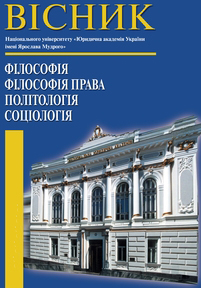ЕКСПЛІКАЦІЯ АКСІОЛОГІЧНОГО АСПЕКТУ КОНЦЕПТУ «ІСТОРИЧНА ПАМ’ЯТЬ»
EXPLICATION OF THE AXIOLOGICAL ASPECT OF THE CONCEPT
«HISTORICAL MEMORY»
Author(s): Oksana Anatoliivna StasevskaSubject(s): Politics of History/Memory
Published by: Національний юридичний університет імені Ярослава Мудрого
Keywords: historical memory; values; identity; value benchmarks;
Summary/Abstract: Problem setting. Socio-cultural and political problems of contemporary Ukrainе gives the study of the axiological aspect of historical memory of particular importance and it ceases to be the peripheral theme of philosophical reflection. Without a clear understanding of the value added of historical memory, further socio-cultural design and forecasting is made impossible.Recent research and publications analysis shows that а significant contribution to the understanding and interpretation of the concept under study belongs to such Ukrainian scholars, which carried out quite productive steps in the theoretical understanding of a significant number of problems of the formation and functioning of historical memory, the determination of mechanisms for constructing national memory, its main features and its role in the process of identification of the Ukrainian people.Paper objective. The purpose of the paper is to define the concept of «historical memory», its structural and functional features and the an attempt to explicate its axiological aspect.Paper main body. The axiological measurement of historical memory has a dual detection. First, in certain periods of the history of a particular society, memory becomes unreliable, the causes of which may be a negative reaction to tragic events and historical facts, or ignorance, or (that is the most terrible) intentional neglect of history. As a result of such unconsciousness, the perception of historical memory gradually formed as an unconditional value, an important component of the axioms of culture, as a necessary condition for the normal functioning of society.The fundamental moments of the concepts of historical memory are: social determinism, the difference from the system of transfer of biological information, recognition of its basis of the formation of individual and social consciousness, its direct influence on the development of historical consciousness of society. The main functions of historical memory are: – informational; – identification; – organizational; – world- view; – value-orientated. It can be presented as a spiritual core, a «national genetic code» that preserves knowledge and information about evolution, specific stages of development, conditions of existence and cultural potential of a society (people, nation) and, having withstood the test of time, has become a value for this community. The axiological dimension of historical memory has a dual discovery. First of all, it must be noted that in certain periods of history in society there is a memory that resulted in the gradual formation of the perception of historical memory as an unconditional value, an important component of the axioms of culture, a necessary condition for the adequate functioning of society. Secondly, historical memory actively forms the value-semantic space of society, is a means of forming a system of values of society. The resulting values of life play a consolidating role in ensuring interethnic accord and civil peace, serve as the formation of the consciousness of the people and the function of preserving the original culture. Historical memory makes it possible to invent and transmit in time importantly integrative ideas, and most importantly – the values without which any community would simply come to a decline.Conclusions of the research. The topicality of the study of the value added of historical memory is conditioned by the need to preserve the integrity of the domestic spiritual space, the development of a stable immunity in society against the threat of the destruction of the existing cultural identity. Historical memory in the modern world, it is simultaneously as a determining element and subject of state policy, a factor in the construction of a political nation, a prerequisite or interethnic and interethnic integration or conflict. At the same time, historical memory is a means of retranslation of political values, which plays an ambitious role in the political process (as an object of political influence and as a means of political influence). It is possible to find the value constants acceptable to the whole society, if the very historical memory is perceived not as an arena of ideological conflicts and as a means of political manipulation, but as an unconditional value.
Journal: Вісник НЮУ імені Ярослава Мудрого. Серія: Філософія, філософія права, політологія, соціологія
- Issue Year: 36/2018
- Issue No: 1
- Page Range: 123-135
- Page Count: 13
- Language: Ukrainian

